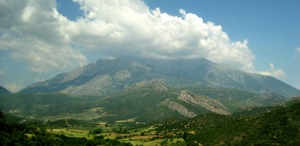Difference between revisions of "Parnassus"
| Line 12: | Line 12: | ||
*In Book 19 of ''[http://en.wikipedia.org/wiki/The_Odyssey The Odyssey]'', Odysseus recounts a [[story]] of how he was gored in the thigh during a boar hunt on Mount Parnassus in his [[youth]]. | *In Book 19 of ''[http://en.wikipedia.org/wiki/The_Odyssey The Odyssey]'', Odysseus recounts a [[story]] of how he was gored in the thigh during a boar hunt on Mount Parnassus in his [[youth]]. | ||
| − | Parnassus was also the home of http://en.wikipedia.org/wiki/Pegasus Pegasus] the winged horse of [http://en.wikipedia.org/wiki/Bellerophon Bellerophon].[http://en.wikipedia.org/wiki/Parnassus] | + | Parnassus was also the home of [http://en.wikipedia.org/wiki/Pegasus Pegasus] the winged horse of [http://en.wikipedia.org/wiki/Bellerophon Bellerophon].[http://en.wikipedia.org/wiki/Parnassus] |
| + | |||
==External links== | ==External links== | ||
*[http://www.greekmountainflora.info/Parnassos/Parnassos.html Greek Mountain Flora] | *[http://www.greekmountainflora.info/Parnassos/Parnassos.html Greek Mountain Flora] | ||
Revision as of 12:12, 18 May 2014
Mount Parnassus is a mountain of barren limestone in central Greece that towers above Delphi, north of the Gulf of Corinth, and offers scenic views of the surrounding olive groves and countryside. According to Greek mythology, this mountain was sacred to Apollo, the Corycian nymphs, and the home of the Muses. The mountain was also favored by the Dorians. The name Parnassos seems etymologically related to the Anatolian languages that made use of *-ssos in placenames (eg. Knossos). *Parna- derived from the same root as the word in Luwian meaning House.
Mythology
Mount Parnassus is named after Parnassos, the son of the nymph Kleodora and the man Kleopompus. There was a city of which Parnassos was leader, which was flooded by torrential rain. The citizens ran from the flood, following wolves' howling, up the mountain slope. There the survivors built another city, and called it Lykoreia, which in Greek means "the howling of the wolves." While Orpheus was living with his mother and his eight beautiful aunts on Parnassus, he met Apollo who was courting the laughing muse Thalia. Apollo became fond of Orpheus and gave him a little golden lyre, and taught him to play it. Orpheus's mother taught him to make verses for singing. As the Oracle of Delphi was sacred to the god Apollo, so did the mountain itself become associated with Apollo. According to some traditions, Parnassus was the site of the fountain Castalia and the home of the Muses; according to other traditions, that honor fell to Mount Helicon, another mountain in the same range. As the home of the Muses, Parnassus became known as the home of poetry, music, and learning.
Parnassus was also the site of several unrelated minor events in Greek mythology.
- In some versions of the Greek flood myth, the ark of Deucalion comes to rest on the slopes of Parnassus.
- Orestes spent his time in hiding on Mount Parnassus.
- Parnassus was sacred to the god Dionysus.
- The Corycian Cave, located on the slopes of Parnassus, was sacred to Pan and to the Muses.
- In Book 19 of The Odyssey, Odysseus recounts a story of how he was gored in the thigh during a boar hunt on Mount Parnassus in his youth.
Parnassus was also the home of Pegasus the winged horse of Bellerophon.[1]
